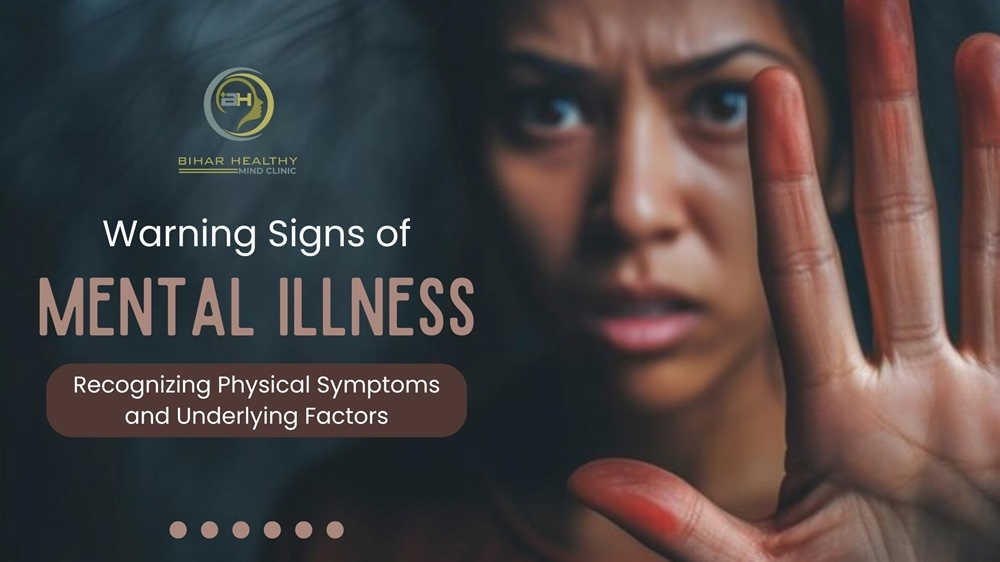
Mental health holds equal importance to physical health, but it often remains overlooked until the symptoms begin to interfere with everyday activities. Identifying the warning signs of mental illness early can make a significant difference in the success of treatment and recovery. At Patna Psychiatry, under the guidance of Dr. Saurabh Kumar, MD (Psychiatry), recognized as one of the Best psychiatrist in Patna, patients receive comprehensive care that focuses on both emotional and physical symptoms. This blog will help you understand the key physical signs, behavioral changes, and contributing factors that may indicate the need for professional psychiatric support.
Why Early Detection is Crucial
Mental illnesses rarely appear suddenly. In most cases, there are subtle changes in mood, thinking, and behavior before the condition becomes severe. By recognizing the symptoms of a mentally ill person early, you can take proactive steps to get help before the situation worsens.
Ignoring these signs can result in chronic distress, strained relationships, and poor work or academic performance. In extreme situations, untreated conditions can lead to self-harm or dangerous behavior.
Physical Symptoms of Mental Illness
While emotional and cognitive signs are widely discussed, many overlook the physical indicators that may point toward mental health challenges.
-
Here are some notable physical symptoms of a mentally ill person:
- Chronic Fatigue: Persistent tiredness, even after adequate rest, can be a sign of depression, anxiety, or other mental health issues.
- Unexplained Aches and Pains: Stress, anxiety, and certain psychiatric disorders can manifest as headaches, muscle pain, or stomach discomfort.
- Changes in Appetite or Weight: Significant weight gain or loss, along with changes in eating habits, may signal an underlying mental health problem.
- Sleep Disturbances: Insomnia, excessive sleeping, or irregular sleep patterns are common among those experiencing depression or bipolar disorder.
- Digestive Problems: Conditions like irritable bowel syndrome (IBS) can be triggered or worsened by anxiety and stress.
- Frequent Illness: A weakened immune system due to chronic stress can lead to recurring infections or slow recovery from illnesses.
These symptoms should not be ignored, especially when they appear alongside emotional or behavioral changes.
Behavioral and Emotional Warning Signs
In addition to physical symptoms, several behavioral and psychological changes may indicate mental health concerns:
- Social Withdrawal: Avoiding family, friends, and social activities.
- Loss of Interest: A noticeable lack of motivation or enthusiasm for hobbies and work.
- Intense Mood Swings: Extreme highs and lows in mood, often without a clear reason.
- Difficulty Concentrating: Challenges in maintaining focus, recalling information, or making choices.
- Irritability and Aggression: Sudden or frequent anger and frustration that negatively impacts personal connections.
- Neglecting Responsibilities: Ignoring work, studies, or personal hygiene.
Some people may use phrases or exhibit behaviors that reflect what is often referred to as symptoms of a mad person, such as talking to themselves persistently, displaying paranoid thinking, or acting in ways disconnected from reality. These should be taken seriously and assessed by a mental health professional.
Factors Contributing to Mental Illness
Understanding the causes behind mental illness is important for prevention and treatment.
-
Common contributing factors include:
- Genetic Predisposition: Having close relatives with mental health conditions can raise the likelihood of developing similar issues.
- Traumatic Experiences: Abuse, accidents, or sudden loss can trigger long-term psychological distress.
- Chronic Stress: Work pressure, financial struggles, and personal conflicts can lead to burnout and anxiety.
- Substance Abuse: Alcohol or drug misuse often worsens or triggers mental health problems.
- Neurological Changes: Imbalances in brain chemistry can cause or contribute to mental illness.
- Medical Conditions: Chronic illnesses such as diabetes, thyroid issues, or neurological disorders can impact mental health.
When to Seek Professional Help
When ongoing changes in physical condition, emotional state, or behavior are observed, it is crucial to get a prompt psychiatric assessment. The Best psychiatrist in Patna can assess the situation, provide a diagnosis, and recommend an effective treatment plan.
-
Patna Psychiatry offers specialized services including:
- Comprehensive psychiatric evaluation
- Medication management
- Psychotherapy and counseling
- Support for families and caregivers
How Patna Psychiatry Can Help
Patna Psychiatry follows a patient-centered approach, ensuring that every treatment plan is tailored to individual needs. By addressing both the physical and emotional warning signs of mental illness, the clinic helps patients regain control over their lives and achieve long-term mental wellness.
From anxiety and depression to complex psychiatric conditions, the clinic provides evidence-based treatments in a compassionate environment.
-
Practical Tips to Support Mental Health
While professional care is essential, you can also take steps to maintain mental well-being:
- Maintain a balanced diet and regular exercise routine.
- Ensure sufficient rest and handle stress by practicing relaxation methods.
- Stay socially connected with friends and family.
- Limit alcohol and avoid recreational drugs.
- Engage in activities that bring joy and relaxation.
Conclusion
Identifying early indicators of mental illness plays an essential role in safeguarding emotional health. Physical symptoms like fatigue, pain, and appetite changes often accompany emotional distress. By understanding these indicators and seeking timely help, you can prevent the progression of mental illness and promote recovery.
If you or someone you know is showing symptoms of a mentally ill person or signs often mistaken as symptoms of a mad person, reach out to Patna Psychiatry. Under the care of Dr. Saurabh Kumar, MD (Psychiatry), the Best psychiatrist in Patna, you’ll receive compassionate, personalized care to restore mental health and improve quality of life.
Disclaimer: All characters and events depicted in this blog are entirely fictional. Any resemblance to actual persons, living or dead, is purely coincidental. The content is intended for informational purposes only and should not be considered as medical advice. Always consult a qualified healthcare professional for medical concerns.
Visitors: 104





No comments yet.